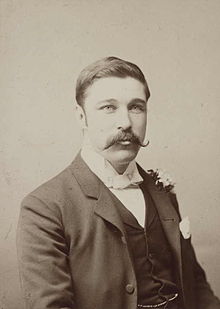Fergus Hume
British writer (1859–1932)
Ferguson Wright Hume (8 July 1859 – 12 July 1932), known as Fergus Hume, was a prolific English novelist, known for his detective fiction, thrillers and mysteries.

Quotes
edit- Raki is bad enough, but it's nectar compared with pulque.
- The Harlequin Opal: A Romance (London: W. H. Allen & Co., Ltd., 1893), vol. 1, ch. 5
- I was not myself on that night. The wine was in and the wit was out.
- The Silent House in Pimlico, 2nd ed. (London: J. Long, 1899)
- History was being manufactured at the rate of a sensation a week.
- A Traitor in London (F. M. Buckles & Co., 1900), ch. 8
- "Whatever you do, don’t go on to the beaches at dusk," was all he said. Then he vanished.
- "The Sand-walker", The Dancer in Red, and Other Stories (London: Digby, Long & Co., 1906)
- Fergus W. Hume, The Mystery of a Hansom Cab (Chicago and New York: Rand, McNally & Co., 1886)
- "Young men, not bein' old men," she replied, cautiously, "and sinners not bein' saints, it's not nattral as latch keys should be made for ornament instead of use, and Mr. Fitzgerald bein' one of the 'andsomest men in Melbourne, it ain't to be expected as 'e should let 'is latch key git rusty, tho', 'avin' a good moral character, 'e uses it with moderation."
- Ch. 9
- It was Saturday morning, and of course all fashionable Melbourne was doing the Block. With regard to its "Block," Collins Street corresponds to New York's Broadway, London's Regent Street and Rotten Row, and to the Boulevards of Paris. It is on the Block that people show off their new dresses, bow to their friends, cut their enemies, and chatter small talk.
- Ch. 10
- "I don't like Latin," said Miss Frettlby, shaking her pretty head. "I agree with Heine's remark, that if the Romans had had to learn it they would not have found time to conquer the world."
- Ch. 10
- Young men of the present day are very fond of running down women, and think it a manly thing to sneer at them for their failings; but God help the man who, in time of trouble, has not a woman to stand by his side with cheering words and loving smiles to help him in the battle of life.
- Ch. 12
- "Diplomacy," said Calton, to one young aspirant for legal honours, "is the oil we cast on the troubled waters of social, professional, and political life; and if you can, by a little tact, manage mankind, you are pretty certain to get on in this world."
- Ch. 14
- Some writer has described Melbourne as Glasgow, with the sky of Alexandria; and certainly the beautiful climate of Australia, so Italian in its brightness, must have a great effect on the nature of such an adaptable race as the Anglo-Saxon. In spite of the dismal prognostications of Marcus Clark regarding the future Australian, whom he describes as being "a tall, coarse, strong-jawed, greedy, pushing, talented man, excelling in swimming and horsemanship," it is more likely that he will be a cultured, indolent individual, with an intense appreciation of the arts and sciences, and a dislike to hard work and utilitarian principles. Climatic influence should be taken into account with regard to the future Australian, and our posterity will be no more like us than the luxurious Venetians resembled their hardy forefathers, who first started to build on those lonely sandy islands of the Adriatic.
- Ch. 15